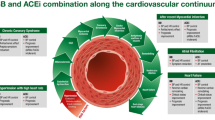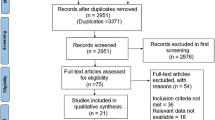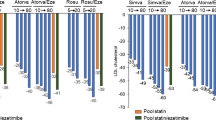Abstract
Purpose of Review
Elevation in apolipoprotein B-containing lipoproteins in the blood is a cause of atherosclerosis. Statins have changed the preventive cardiology scenario, and more recently monoclonal proprotein convertase subtilisin kexin type 9 (PCSK9) inhibitors were added as robust agents to further reduce pro-atherogenic lipoproteins and therefore prevent cardiovascular events. However, despite this many dyslipidemic individuals persist with inadequate LDL-C levels and still at risk. The purpose of this review was to discuss current status and describe advances in therapies beyond statins and monoclonal PCSK9 inhibitors.
Recent Findings
Ezetimibe and lomitapide have been used for many years to further reduce LDL-C and longer term data reinforce their safety. Bempedoic acid, an inhibitor of adenosine triphosphate-citrate lyase, has been shown to add LDL-C reduction on top of statins and ezetimibe, furthermore it may be an alternative for statin intolerant patients. Inclisiran is a small interfering ribonucleic acid inhibitor that reduces the hepatic production of PCSK9 that induces robust LDL-C lowering, similar to monoclonal antibodies, with the advantage of 2 or 3 injections per year. So far, no safety signs were seen with its use. Evinacumab, a monoclonal antibody that binds angiopoietin-like protein 3 (ANGPTL3), induces robust LDL-C lowering in either homozygous familial hypercholesterolemia or severe hypercholesterolemia patients with good tolerability.
Summary
Many high-risk individuals persist with elevated LDL-C, newer medications further lower LDL-C on top of standard lipid-lowering therapies and are well tolerated. Ongoing clinical trials may prove if these novel medications will reduce cardiovascular events with safety.

Similar content being viewed by others
References
Papers of particular interest, published recently, have been highlighted as: • Of importance •• Of major importance
GBD 2017 Causes of Death Collaborators. Global, regional, and national age-sex-specific mortality for 282 causes of death in 195 countries and territories, 1980–2017: a systematic analysis for the Global Burden of Disease Study 2017. Lancet. 2018;392(10159):1736–88. https://doi.org/10.1016/S0140-6736(18)32203-7.
Libby P, Buring JE, Badimon L, Hansson GK, Deanfield J, Bittencourt MS, et al. Atherosclerosis. Nat Rev Dis Primers. 2019;5(1):56. https://doi.org/10.1038/s41572-019-0106-z.
Sniderman AD, Thanassoulis G, Glavinovic T, Navar AM, Pencina M, Catapano A, et al. Apolipoprotein B particles and cardiovascular disease: a narrative review. JAMA Cardiol. 2019;4(12):1287–95. https://doi.org/10.1001/jamacardio.2019.3780.
Tsimikas S, Fazio S, Ferdinand KC, Ginsberg HN, Koschinsky ML, Marcovina SM, et al. NHLBI working group recommendations to reduce lipoprotein(a)-mediated risk of cardiovascular disease and aortic stenosis. J Am Coll Cardiol. 2018;71(2):177–92. https://doi.org/10.1016/j.jacc.2017.11.014.
Nordestgaard BG, Varbo A. Triglycerides and cardiovascular disease. Lancet. 2014;384(9943):626–35. https://doi.org/10.1016/S0140-6736(14)61177-6.
Ference BA, Schunkert H, Watts GF, Borén J, Fazio S, Horton JD, et al. Low-density lipoproteins cause atherosclerotic cardiovascular disease. 1. Evidence from genetic, epidemiologic, and clinical studies. A consensus statement from the European Atherosclerosis Society Consensus Panel. Eur Heart J. 2017;38(32):2459–72. https://doi.org/10.1093/eurheartj/ehx144.
Defesche JC, Gidding SS, Harada-Shiba M, Hegele RA, Santos RD, Wierzbicki AS. Familial hypercholesterolaemia. Nat Rev Dis Primers. 2017;3:17093. https://doi.org/10.1038/nrdp.2017.93.
Hu P, Dharmayat KI, Stevens CAT, Sharabiani MTA, Jones RS, Watts GF, et al. Prevalence of familial hypercholesterolemia among the general population and patients with atherosclerotic cardiovascular disease: a systematic review and meta-analysis. Circulation. 2020;141(22):1742–59. https://doi.org/10.1161/CIRCULATIONAHA.119.044795.
Watts GF, Sullivan DR, Hare DL, Kostner KM, Horton AE, Bell DA, et al. Integrated guidance for enhancing the care of familial hypercholesterolaemia in Australia. Heart Lung Circ. 2020;30:324–49. https://doi.org/10.1016/j.hlc.2020.09.943.
Santos RD. Expression of LDLRs (low-density lipoprotein receptors), dyslipidemia severity, and response to PCSK9 (proprotein convertase subtilisin kexin type 9) inhibition in homozygous familial hypercholesterolemia: connecting the dots. Arterioscler Thromb Vasc Biol. 2018;38(3):481–3. https://doi.org/10.1161/ATVBAHA.117.310675.
Santos RD, Sposito AC, Ventura LI, Cesar LA, Ramires JA, Maranhao RC. Effect of pravastatin on plasma removal of a chylomicron-like emulsion in men with coronary artery disease. Am J Cardiol. 2000;85(10):1163–6.
Collins R, Reith C, Emberson J, Armitage J, Baigent C, Blackwell L, et al. Interpretation of the evidence for the efficacy and safety of statin therapy. Lancet. 2016;388(10059):2532–61. https://doi.org/10.1016/S0140-6736(16)31357-5.
Ferrari F, Martins VM, Rocha VZ, Santos RD. Advances with lipid-lowering drugs for pediatric patients with familial hypercholesterolemia. Expert Opin Pharmacother. 2020:1–13. https://doi.org/10.1080/14656566.2020.1832991Extensive review on treatment for pediatric familial hypercholesterolemia.
Rached F, Santos RD. The role of statins in current guidelines. Curr Atheroscler Rep. 2020;22(9):50. https://doi.org/10.1007/s11883-020-00861-9.
Ridker PM. Clinician’s guide to reducing inflammation to reduce atherothrombotic risk: JACC review topic of the week. J Am Coll Cardiol. 2018;72(25):3320–31. https://doi.org/10.1016/j.jacc.2018.06.082.
Danchin N, Almahmeed W, Al-Rasadi K, Azuri J, Berrah A, Cuneo CA, et al. Achievement of low-density lipoprotein cholesterol goals in 18 countries outside Western Europe: the International ChoLesterol management Practice Study (ICLPS). Eur J Prev Cardiol. 2018;25(10):1087–94. https://doi.org/10.1177/2047487318777079.
Boekholdt SM, Hovingh GK, Mora S, Arsenault BJ, Amarenco P, Pedersen TR, et al. Very low levels of atherogenic lipoproteins and the risk for cardiovascular events: a meta-analysis of statin trials. J Am Coll Cardiol. 2014;64(5):485–94. https://doi.org/10.1016/j.jacc.2014.02.615.
Perez de-Isla L, Alonso R, Watts GF, Mata N, Saltijeral A, Muñiz O, et al. Attainment of LDL cholesterol treatment goals in patients with familial hypercholesterolemia at 5-year follow-up: SAFEHEART Registry. J Am Coll Cardiol. 2016;67:1278–85. https://doi.org/10.1016/j.jacc.2016.01.008.
Blom DJ, Almahmeed W, Al-Rasadi K, Azuri J, Daclin V, Kayikcioglu M, et al. Low-density lipoprotein cholesterol goal achievement in patients with familial hypercholesterolemia in countries outside Western Europe: the International ChoLesterol management Practice Study. J Clin Lipidol. 2019;13(4):594–600. https://doi.org/10.1016/j.jacl.2019.05.004.
Cannon CP, Blazing MA, Giugliano RP, McCagg A, White JA, Theroux P, et al. Ezetimibe added to statin therapy after acute coronary syndromes. N Engl J Med. 2015;372(25):2387–97. https://doi.org/10.1056/NEJMoa1410489.
Ouchi Y, Sasaki J, Arai H, Yokote K, Harada K, Katayama Y, et al. Ezetimibe lipid-lowering trial on prevention of atherosclerotic cardiovascular disease in 75 or older (EWTOPIA 75): a randomized, controlled trial. Circulation. 2019;140(12):992–1003. https://doi.org/10.1161/CIRCULATIONAHA.118.039415.
Abifadel M, Varret M, Rabès J, Allard D, Ouguerram K, Devillers M, et al. Mutations in PCSK9 cause autosomal dominant hypercholesterolemia. Nat Genet. 2003;34(2):154–6.
Ito MK, Santos RD. PCSK9 inhibition with monoclonal antibodies: modern management of hypercholesterolemia. J Clin Pharmacol. 2017;57(1):7–32. https://doi.org/10.1002/jcph.766.
Kastelein JJ, Robinson JG, Farnier M, Krempf M, Langslet G, Lorenzato C, et al. Efficacy and safety of alirocumab in patients with heterozygous familial hypercholesterolemia not adequately controlled with current lipid-lowering therapy: design and rationale of the ODYSSEY FH studies. Cardiovasc Drugs Ther. 2014;28(3):281–9.
Santos RD, Stein EA, Hovingh GK, Blom DJ, Soran H, Watts GF, et al. Long-term evolocumab in patients with familial hypercholesterolemia. J Am Coll Cardiol. 2020;75(6):565–74. https://doi.org/10.1016/j.jacc.2019.12.020Study showing a 4-year median effect of evolocumab in heterozygous and homozygous FH. There was no loss of LDL-C lowering effect and treatment was safe and well tolerated.
Sabatine MS, Giugliano RP, Keech AC, Honarpour N, Wiviott SD, Murphy SA, et al. Evolocumab and clinical outcomes in patients with cardiovascular disease. N Engl J Med. 2017;376:1713–22. https://doi.org/10.1056/NEJMoa1615664.
Schwartz GG, Steg PG, Szarek M, Bhatt DL, Bittner VA, Diaz R, et al. Alirocumab and cardiovascular outcomes after acute coronary syndrome. N Engl J Med. 2018;379(22):2097–107. https://doi.org/10.1056/NEJMoa1801174.
Ridker PM, Rose LM, Kastelein JJ, Santos RD, Wei C, Revkin J, et al. Cardiovascular event reduction with PCSK9 inhibition among 1578 patients with familial hypercholesterolemia: results from the SPIRE randomized trials of bococizumab. J Clin Lipidol. 2018;12(4):958–65.
Ridker PM, Tardif JC, Amarenco P, Duggan W, Glynn RJ, Jukema JW, et al. Lipid-reduction variability and antidrug-antibody formation with bococizumab. N Engl J Med. 2017;376(16):1517–26. https://doi.org/10.1056/NEJMoa1614062.
Santos RD, Ruzza A, Hovingh GK, Wiegman A, Mach F, Kurtz CE, et al. Evolocumab in pediatric heterozygous familial hypercholesterolemia. N Engl J Med. 2020;383(14):1317–27. https://doi.org/10.1056/NEJMoa2019910First pediatric study of a PCSK9 inhibitor in heterozygous familial hypercholesterolemia showed a 38% reduction vs. placebo in LDL-C and good short term tolerability and safety.
Raal FJ, Hovingh GK, Blom D, Santos RD, Harada-Shiba M, Bruckert E, et al. Long-term treatment with evolocumab added to conventional drug therapy, with or without apheresis, in patients with homozygous familial hypercholesterolaemia: an interim subset analysis of the open-label TAUSSIG study. Lancet Diabetes Endocrinol. 2017;5(4):280–90. https://doi.org/10.1016/s2213-8587(17)30044-x.
Blom DJ, Harada-Shiba M, Rubba P, Gaudet D, Kastelein JJP, Charng MJ, et al. Efficacy and safety of alirocumab in adults with homozygous familial hypercholesterolemia: the ODYSSEY HoFH trial. J Am Coll Cardiol. 2020;76(2):131–42. https://doi.org/10.1016/j.jacc.2020.05.027.
Thedrez A, Blom DJ, Ramin-Mangata S, Blanchard V, Croyal M, Chemello K, et al. Homozygous familial hypercholesterolemia patients with identical mutations variably express the LDLR (low-density lipoprotein receptor): implications for the efficacy of evolocumab. Arterioscler Thromb Vasc Biol. 2018;38(3):592–8. https://doi.org/10.1161/ATVBAHA.117.310217.
Underberg JA, Cannon CP, Larrey D, Makris L, Blom D, Phillips H. Long-term safety and efficacy of lomitapide in patients with homozygous familial hypercholesterolemia: five-year data from the Lomitapide Observational Worldwide Evaluation Registry (LOWER). J Clin Lipidol. 2020;14(6):807–17. https://doi.org/10.1016/j.jacl.2020.08.006Shows long-term effect of lomitapide in an open long-term registry in homozygous FH patients. In this study lower doses were used, those who tolerated the medication had 35–45% reduction in LDL-C on top of standard therapy. Most adverse events were well tolerated.
Raal FJ, Rosenson RS, Reeskamp LF, Hovingh GK, Kastelein JJP, Rubba P, et al. Evinacumab for homozygous familial hypercholesterolemia. N Engl J Med. 2020;383(8):711–20. https://doi.org/10.1056/NEJMoa2004215Seminal study showing an average 45% reduction in LDL-C in homozygous FH on top of available therapies like statins, ezetimibe, monoclonal PCSK9 inhibitors, lomitapide, and LDL-apheresis. LDL-C reduction was independent of the LDLR expression. Evinacumab was well tolerated.
Cuchel M, Meagher EA, du Toit TH, Blom DJ, Marais AD, Hegele RA, et al. Efficacy and safety of a microsomal triglyceride transfer protein inhibitor in patients with homozygous familial hypercholesterolaemia: a single-arm, open-label, phase 3 study. Lancet. 2013;381(9860):40–6. https://doi.org/10.1016/S0140-6736(12)61731-0.
Blom DJ, Averna MR, Meagher EA, du Toit TH, Sirtori CR, Hegele RA, et al. Long-term efficacy and safety of the microsomal triglyceride transfer protein inhibitor lomitapide in patients with homozygous familial hypercholesterolemia. Circulation. 2017;136(3):332–5. https://doi.org/10.1161/CIRCULATIONAHA.117.028208.
Wang N, Fulcher J, Abeysuriya N, Park L, Kumar S, Di Tanna GL, et al. Intensive LDL cholesterol-lowering treatment beyond current recommendations for the prevention of major vascular events: a systematic review and meta-analysis of randomised trials including 327 037 participants. Lancet Diabetes Endocrinol. 2020;8(1):36–49. https://doi.org/10.1016/S2213-8587(19)30388-2This meta-analysis enrolled more than 327,000 patients and showed that the benefits of statins, ezetimibe, and monoclonal PCSK9 inhibitors on atherosclerotic cardiovascular disease events are similar and proportional to LDL-C lowering.
Cholesterol Treatment Trialists C, Baigent C, Blackwell L, Emberson J, Holland LE, Reith C, et al. Efficacy and safety of more intensive lowering of LDL cholesterol: a meta-analysis of data from 170,000 participants in 26 randomised trials. Lancet. 2010;376(9753):1670–81. https://doi.org/10.1016/S0140-6736(10)61350-5.
Raal FJ, Kallend D, Ray KK, Turner T, Koenig W, Wright RS, et al. Inclisiran for the treatment of heterozygous familial hypercholesterolemia. N Engl J Med. 2020;382(16):1520–30. https://doi.org/10.1056/NEJMoa1913805Important study showing that inclisiran reduces LDL-C by 45–50% in heterozygous FH with good tolerability and safety with a few injections per year.
Ray KK, Wright RS, Kallend D, Koenig W, Leiter LA, Raal FJ, et al. Two phase 3 trials of inclisiran in patients with elevated LDL cholesterol. N Engl J Med. 2020;382(16):1507–19 Two phase III studies showing robust LDL-C reduction and good tolerability of inclisiran in patients with refractory hypercholesterolemia with 2 to 3 injections per year.
Rosenson RS, Burgess LJ, Ebenbichler CF, Baum SJ, Stroes ESG, Ali S, et al. Evinacumab in patients with refractory hypercholesterolemia. N Engl J Med. 2020;383(24):2307–19. https://doi.org/10.1056/NEJMoa2031049Important study that extended the effects of evinacumab to patients with refractory hypercholesterolemia and heterozygous FH (all were in use of monoclonal PCSK9 inhibitors).
Brandts J, Ray KK. Bempedoic acid, an inhibitor of ATP citrate lyase for the treatment of hypercholesterolemia: early indications and potential. Expert Opin Investig Drugs. 2020;29(8):763–70. https://doi.org/10.1080/13543784.2020.1778668Excellent and extensive review of mode of action, pharmacology, and effects of bempedoic acid.
Stroes ES, Thompson PD, Corsini A, Vladutiu GD, Raal FJ, Ray KK, et al. Statin-associated muscle symptoms: impact on statin therapy-European Atherosclerosis Society Consensus Panel statement on assessment, aetiology and management. Eur Heart J. 2015;36(17):1012–22. https://doi.org/10.1093/eurheartj/ehv043.
Banach M, Duell PB, Gotto AM Jr, Laufs U, Leiter LA, Mancini GBJ, et al. Association of bempedoic acid administration with atherogenic lipid levels in phase 3 randomized clinical trials of patients with hypercholesterolemia. JAMA Cardiol. 2020;5:1124. https://doi.org/10.1001/jamacardio.2020.2314.
Bays HE, Banach M, Catapano AL, Duell PB, Gotto AM Jr, Laufs U, et al. Bempedoic acid safety analysis: pooled data from four phase 3 clinical trials. J Clin Lipidol. 2020;14(5):649–59 e6. https://doi.org/10.1016/j.jacl.2020.08.009Study shows the safety of bempedoic acid in phase 3 trials.
Laufs U, Banach M, Mancini GBJ, Gaudet D, Bloedon LT, Sterling LR, et al. Efficacy and safety of bempedoic acid in patients with hypercholesterolemia and statin intolerance. J Am Heart Assoc. 2019;8(7):e011662. https://doi.org/10.1161/JAHA.118.011662.
Ballantyne CM, Laufs U, Ray KK, Leiter LA, Bays HE, Goldberg AC, et al. Bempedoic acid plus ezetimibe fixed-dose combination in patients with hypercholesterolemia and high CVD risk treated with maximally tolerated statin therapy. Eur J Prev Cardiol. 2020;27(6):593–603. https://doi.org/10.1177/2047487319864671.
Wang X, Zhang Y, Tan H, Wang P, Zha X, Chong W, et al. Efficacy and safety of bempedoic acid for prevention of cardiovascular events and diabetes: a systematic review and meta-analysis. Cardiovasc Diabetol. 2020;19(1):128. https://doi.org/10.1186/s12933-020-01101-9.
Fitzgerald K, White S, Borodovsky A, Bettencourt BR, Strahs A, Clausen V, et al. A highly durable RNAi therapeutic inhibitor of PCSK9. N Engl J Med. 2017;376(1):41–51. https://doi.org/10.1056/NEJMoa1609243.
Ray KK, Landmesser U, Leiter LA, Kallend D, Dufour R, Karakas M, et al. Inclisiran in patients at high cardiovascular risk with elevated LDL cholesterol. N Engl J Med. 2017;376(15):1430–40. https://doi.org/10.1056/NEJMoa1615758.
Gaudet D, Gipe DA, Pordy R, Ahmad Z, Cuchel M, Shah PK, et al. ANGPTL3 inhibition in homozygous familial hypercholesterolemia. N Engl J Med. 2017;377(3):296–7. https://doi.org/10.1056/NEJMc1705994.
Musunuru K, Pirruccello JP, Do R, Peloso GM, Guiducci C, Sougnez C, et al. Exome sequencing, ANGPTL3 mutations, and familial combined hypolipidemia. N Engl J Med. 2010;363(23):2220–7. https://doi.org/10.1056/NEJMoa1002926.
Dewey FE, Gusarova V, Dunbar RL, O'Dushlaine C, Schurmann C, Gottesman O, et al. Genetic and pharmacologic inactivation of ANGPTL3 and cardiovascular disease. N Engl J Med. 2017;377(3):211–21. https://doi.org/10.1056/NEJMoa1612790.
Ruscica M, Zimetti F, Adorni MP, Sirtori CR, Lupo MG, Ferri N. Pharmacological aspects of ANGPTL3 and ANGPTL4 inhibitors: new therapeutic approaches for the treatment of atherogenic dyslipidemia. Pharmacol Res. 2020;153:104653. https://doi.org/10.1016/j.phrs.2020.104653.
Grundy SM, Stone NJ, Bailey AL, Beam C, Birtcher KK, Blumenthal RS, et al. 2018 AHA/ACC/AACVPR/AAPA/ABC/ACPM/ADA/AGS/APhA/ASPC/NLA/PCNA guideline on the management of blood cholesterol: a report of the American College of Cardiology/American Heart Association Task Force on Clinical Practice Guidelines. J Am Coll Cardiol. 2019;73(24):e285–350. https://doi.org/10.1016/j.jacc.2018.11.003.
Mach F, Baigent C, Catapano AL, Koskinas KC, Casula M, Badimon L, et al. 2019 ESC/EAS guidelines for the management of dyslipidaemias: lipid modification to reduce cardiovascular risk. Eur Heart J. 2020;41(1):111–88. https://doi.org/10.1093/eurheartj/ehz455.
Funding
RDS is recipient of a scholarship from Conselho Nacional de Pesquisa e Desenvolvimento Tecnológico, Brazil (CNPq) No. 303734/2018-3.
Author information
Authors and Affiliations
Corresponding author
Ethics declarations
Conflict of Interest
FR has nothing to declare. RDS has received honoraria related to consulting, research, and/or speaker activities from Abbott, Ache, Amgen, AstraZeneca, Esperion, EMS, Getz pharma, Kowa, Libbs, Novo-Nordisk, Novartis, Merck, MSD, Pfizer, PTC Therapeutics, and Sanofi/Regeneron.
Human and Animal Rights and Informed Consent
This article does not contain any studies with human or animal subjects performed by any of the authors.
Additional information
Publisher’s Note
Springer Nature remains neutral with regard to jurisdictional claims in published maps and institutional affiliations.
This article is part of the Topical Collection on Lipid Abnormalities and Cardiovascular Prevention
Rights and permissions
About this article
Cite this article
Rached, F., Santos, R.D. Beyond Statins and PCSK9 Inhibitors: Updates in Management of Familial and Refractory Hypercholesterolemias. Curr Cardiol Rep 23, 83 (2021). https://doi.org/10.1007/s11886-021-01514-2
Accepted:
Published:
DOI: https://doi.org/10.1007/s11886-021-01514-2




